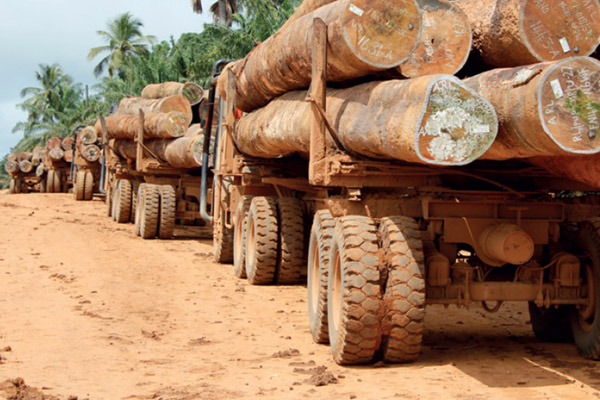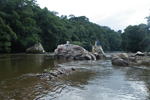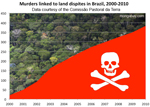At least 908 people were murdered for taking a stand to defend the environment between 2002 and 2013, according to a new report today from Global Witness, which shows a dramatic uptick in the murder rate during the past four years. Notably, the report appears on the same day that another NGO, Survival International, released a video of a gunman terrorizing a Guarani indigenous community in Brazil, which has recently resettled on land taken from them by ranchers decades ago. According to the report, nearly half of the murders over the last decade occurred in Brazil—448 in all—and over two-thirds—661—involved land conflict.
“There can be few starker or more obvious symptoms of the global environmental crisis than a dramatic upturn in killings of ordinary people defending rights to their land or environment,” said Oliver Courtney of Global Witness. “Yet this rapidly worsening problem is going largely unnoticed, and those responsible almost always get away with it. We hope our findings will act as the wake-up call that national governments and the international community clearly need.”
But as grisly as the report is, it’s likely a major underestimation of the issue. The report covers just 35 countries where violence against environmental activists remains an issue, but leaves out a number of major countries where environmental-related murders are likely occurring but with scant reporting.

The elderly Frédéric Moloma Tuka was beaten to death during protests over logging operations in the Democratic Republic of Congo. Photo by: © Greenpeace DRC.
“Because of the live, under-recognized nature of this problem, an exhaustive global analysis of the situation is not possible,” reads the report. “For example, African countries such as Nigeria, Democratic Republic of Congo, Central African Republic and Zimbabwe that are enduring resource-fueled unrest are highly likely to be affected, but information is almost impossible to gain without detailed field investigations.”
In fact, reports of hundreds of additional killings in countries like Ethiopia, Myanmar, Venezuela, and Zimbabwe were left out due to lack of rigorous information.
Even without these countries included, the number of environmental activists killed nearly approaches the number of journalists murdered during the same period—913—an issue that gets much more press. Environmental activists most at risk are people fighting specific industries.
“Many of those facing threats are ordinary people opposing land grabs, mining operations and the industrial timber trade, often forced from their homes and severely threatened by environmental devastation,” reads the report. “Indigenous communities are particularly hard hit. In many cases, their land rights are not recognized by law or in practice, leaving them open to exploitation by powerful economic interests who brand them as ‘anti-development’.”
Video of gunman terrorizing Guarani community. Video courtesy of Survival International.
As if to highlight these points, Survival International released a video today that the groups says shows a gunman firing at the Pyelito Kuê community of Guarani indigenous people. The incident injured one woman, according to the group. The Guarani have been campaigning for decades to have land returned to them that has been taken by ranchers.
“This video gives a brief glimpse of what the Guarani endure month after month—harassment, intimidation, and sometimes murder, just for trying to live in peace on tiny fractions of the ancestral land that was once stolen from them,” the director of Survival International, Stephen Corry, said. “Is it too much to expect the Brazilian authorities, given the billions they’re spending on the World Cup, to sort this problem out once and for all, rather than let the Indians’ misery continue?”
According to the report, two major drivers of repeated violence against environmental activists are a lack of attention to the issue and widespread impunity for perpetrators. In fact, Global Witness found that only ten people have been convicted for the 908 murders documented in the report, meaning a conviction rate of just 1.1 percent to date.
“Environmental human rights defenders work to ensure that we live in an environment that enables us to enjoy our basic rights, including rights to life and health,” John Knox, UN Independent Expert on Human Rights and the Environment said. “The international community must do more to protect them from the violence and harassment they face as a result.”

Logging trucks in Liberia. In the last two years alone, 23 killings were connected to deforestation and illegal logging. Photo by: © Global Witness.
Related articles
Costa Rican environmentalist pays ultimate price for his dedication to sea turtles

(06/10/2013) On the evening of May 30th, 26-year-old Jairo Mora Sandoval was murdered on Moin beach near Limón, Costa Rica, the very stretch of sand where he courageously monitored sea turtle nests for years even as risks from poachers rose, including threats at gunpoint. A dedicated conservationist, Sandoval was kidnapped along with four women volunteers (three Americans and one from Spain) while driving along the beach looking for nesting sea turtles. Sandoval was separated from the women—who eventually escaped their captors—but the young Costa Rican was stripped naked, bound, and viciously beaten. Police found him the next day, face-down and handcuffed in the sand; Sandoval died of asphyxiation.
Landowner who allegedly ordered Amazon murders acquitted
(04/10/2013) Jose Rodrigues Moreira, a Brazilian landowner who allegedly ordered the killings of Amazon activists Jose Claudio Ribeiro da Silva and his wife Maria, was acquitted this week due to lack of evidence. But, the two men who carried out the assassinations, Lindonjonson Silva Rocha and Alberto Lopes do Nascimento, were found guilty and sent to 42 and 45 years of jail respectively.
Killings over land continues in the Amazon
(04/04/2013) On Wednesday, in the Brazilian state of Pará, the trial begins of three men accused of murdering José Cláudio Ribeiro da Silva and his wife Maria do Espirito Santo, who had campaigned against loggers and ranchers for years. Their assassinations in May 2011 generated international outrage, just like that of Chico Mendes, 25 years ago, and that of the American-born nun Dorothy Stang in 2005.
Indigenous protester killed by masked assailants in Panama over UN-condemned dam

(03/25/2013) A Ngäbe indigenous Panamanian, Onesimo Rodriguez, opposing the Barro Blanco hydroelectric dam project was killed last Friday evening by four masked men. His body was then thrown into a nearby stream where it was discovered the following day. Onesimo Rodriguez was attacked with a companion in Las Nubes, after they had attended a demonstration in Cerro Punta, Bugaba, against the dam. His companion, whose identity is being withheld for security reasons, received serious injuries but managed to escape and is having his injuries tended to by the local indigenous community.
Investors beware: global land grabbing ends in ‘financial damage’ and human rights violations

(02/07/2013) Investing in companies that flout local community rights in developing countries often leads to severe economic losses, according to a new report from the Rights and Resources Initiative (RRI). A rising trend in “land grabbing” from Africa to South America by corporations and even foreign governments results in social instability, which can lead to large-scale protests, violence, and even murder, delaying and sometimes derailing projects. Such instability poses massive risk to any investor, not to mention supporting corporate entities that are accused of ignoring human rights.
Cambodia drops case of murdered forest activist, Chut Wutty
(10/08/2012) An investigation into the mysterious death of Cambodian forest activist, Chut Wutty, has been dismissed by the courts, which critics allege is apart of an ongoing cover up. The court decided that since the suspect in Wutty’s death, In Rattana, was also dead there was no need to proceed. Chut Witty was shot to death while escorting two journalists to a logging site run by Timbergreen. Wutty, whose death made international news, was a prominent activist against illegal logging in Cambodia.
Another journalist attacked in Cambodia for covering illegal logging
(09/27/2012) Two weeks after an environmental journalist was found murdered in the trunk of his car, another journalist has been brutally attacked in Cambodia. Ek Sokunthy with the local paper Ta Prum says he was beaten in his home by three assailants by a pistol and a stick. The attack follows swiftly after the high-profile murder of 44-year-old forest journalist Hang Serei Oudom.
Environmental journalist investigating illegal logging murdered in Cambodia
(09/13/2012) Less than five months after high-profile forest activist, Chut Wutty, was killed in Cambodia, an environmental journalist, Hang Serei Oudom, has been found slain in the trunk of his car, possibly murdered with an ax, reports the AFP. Oudum, who worked at the local paper Vorakchun Khmer Daily, was known for writing stories on epidemic of illegal logging in Cambodia, often linking the crime to business people and politicians. The car and body were found in a cashew nut plantation in Ratanakiri province, an area rife with logging.
Over 700 people killed defending forest and land rights in past ten years

(06/19/2012) On May 24th, 2011, forest activist José Cláudio Ribeiro da Silva and his wife, Maria do Espírito Santo da Silva, were gunned down in an ambush in the Brazilian state of Pará. A longtime activist, José Cláudio Ribeiro da Silva had made a name for himself for openly criticizing illegal logging in the state which is rife with deforestation. The killers even cut off the ears of the da Silvas, a common practice of assassins in Brazil to prove to their employers that they had committed the deed. Less than a year before he was murdered, da Silva warned in a TEDx Talk, “I could get a bullet in my head at any moment…because I denounce the loggers and charcoal producers.”